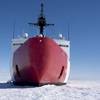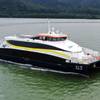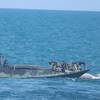According to reports, shipbuilders are capable of building cruise ships even larger than Royal Caribbean International's planned 6,000-passenger Genesis vessel. But whether passengers and ports are ready for future behemoths is another question, cruise-industry officials said Wednesday.
There are no basic technical constraints to further size increases, Maurizio Cergol, cruise vessel chief designer for Italy's Fincantieri shipbuilding yard, said during a panel discussion on megaships at the Seatrade Cruise Shipping Convention, the cruise industry's annual trade show at the Miami Beach Convention Center.
Cergol's vision of virtually limitless increases in cruise ship size in the future was echoed by Tom Degerman, vice president of cruise vessels for Aker Finnyards, another European shipbuilder.
Cergol said cruise lines have economic incentives to build huge ships because of the "economies of scale" they provide, such as reduced investment, crew expenses and operating expenses per berth, compared with smaller ships.
However, he noted there also are disadvantages to larger ships, such as a lack of ports able to accommodate the super-large vessels, the higher cost of building them, potentially long waiting lines for passengers, a reduced number of cabins with windows and less open-deck space.
To put the growth of cruise ships into perspective, Degerman noted that just several years ago -- in 1999 -- the new generation of megaships was led by Royal Caribbean's Voyager of the Seas, which is 137,300 tons and has 1,557 cabins.
Today, the largest ship soon will be Royal Caribbean's Freedom of the Seas, slated for delivery this spring, at 158,000 tons with 1,816 cabins. In comparison, Royal Caribbean's Genesis ship, scheduled for delivery in 2009, will be 220,000 tons with
2,700 cabins, Degerman said.
He said the huge ships of the future will be too big for many ports, and may require passengers to be shuttled by boats to and from the vessels, which could be parked offshore.
During a "state of the industry" discussion Tuesday, executives from the two largest cruise lines -- Carnival and Royal Caribbean, both based in Miami -- clashed over whether cruise lines should continue to build larger ships.
Royal Caribbean President Adam Goldstein said his company is focusing on bringing the super-large Freedom of the Seas vessel into service, while planning for the arrival of the even-larger Genesis in several years.
MSC Cruises President Richard Sasso said bigger ships pique the public's interest.
Bruno-Elias Ramos, president of BEA International, a cruise terminal firm, cautioned that check-in times at terminals have doubled or tripled -- now taking four to six hours -- since the Sept. 11, 2001, terrorist attacks because of heightened security, and larger ships could lengthen the process for passengers.
The huge ships of the future also pose challenges for ports, said William Tatham, vice president of the Port Authority of Jamaica.
Already, larger cruise ship crowds disembarking in Jamaica on port-of-call stops have resulted in cruise lines "funneling off passengers in many directions" for on-shore excursions, by finding alternatives to the traditional tours and attractions, Tatham said.
At Port Canaveral in Brevard County, officials gave Royal Caribbean representatives a tour of the port in hopes of enticing the company to base a future super-sized ship there, Canaveral Port Authority Commission Ray Sharkey said before Wednesday's session.
Port officials plan to remove a corner of the Port Canaveral's western turning basin to create more room for the ships of the future, Sharkey said.
Source: Florida Today
Featured videos

Unlock Onboard Data Efficiencies

Tracking Foreign Vessels Working in the U.S. Jones Act Market

Inmarsat Enhances Service to Drive Digitalization
Subscribe for
Maritime Reporter E-News
Maritime Reporter E-News is the maritime industry's largest circulation and most authoritative ENews Service, delivered to your Email five times per week









